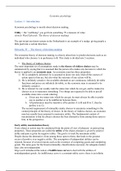Summary
Economic psychology, extensive summary of lectures & articles
- Course
- Institution
This is a summary of Economic Psychology , given at Tilburg University. This summary contains extensive information of the 13 lectures, including relevant notes and all (obligatory) articles: - Edwards, W. (1954). The theory of decision making. Psychological Bulletin, 51, 380-417. - Kahneman, D., ...
[Show more]



